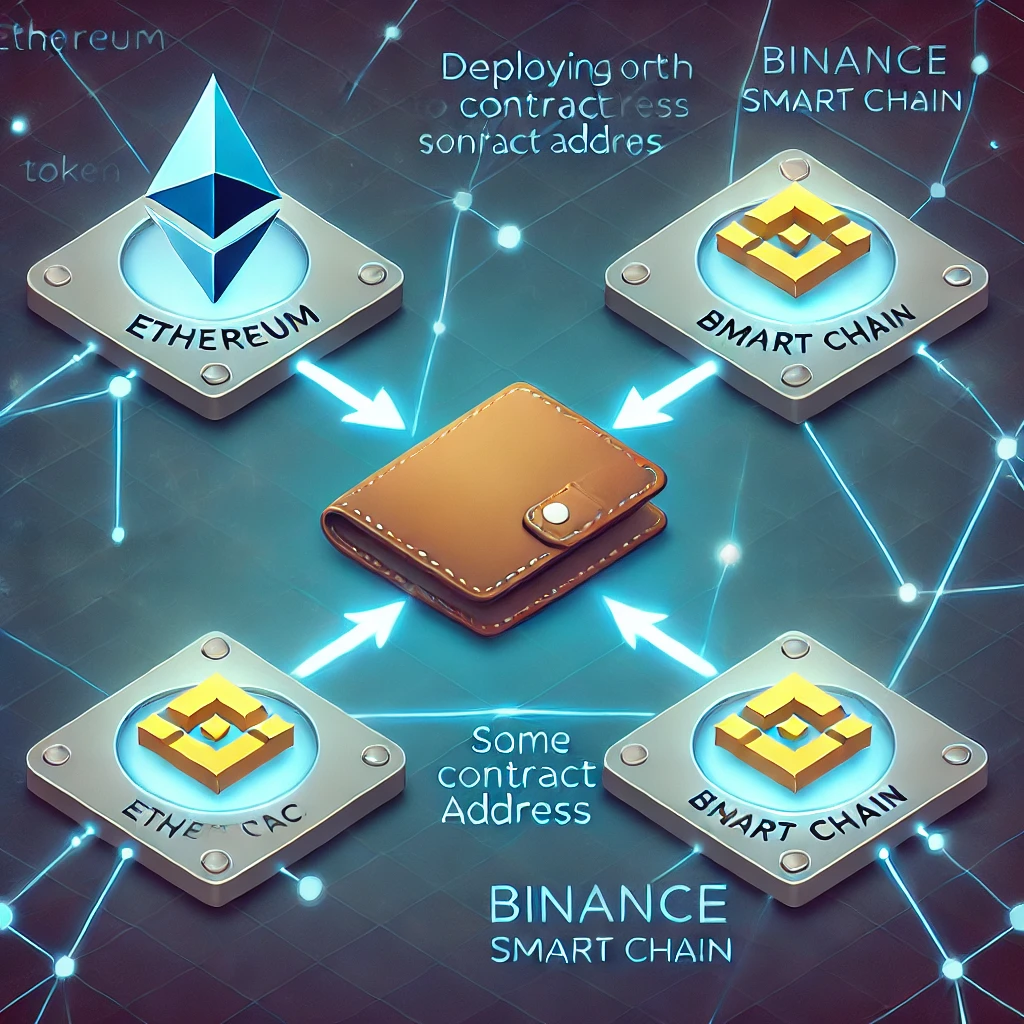
In the world of blockchain, it’s common to think that each network (Ethereum, Binance Smart Chain, Polygon, etc.) will always generate unique contract addresses for the same token. However, there is an interesting and little-known phenomenon where you can have the same token address on multiple networks, like Ethereum and Binance Smart Chain. In this blog, I’ll walk you through how that’s possible, the technical explanation behind it, and what it means for blockchain developers.
To understand how I managed to get the same token contract address on both Ethereum and BSC, we need to dive into how smart contract addresses are generated.
In EVM (Ethereum Virtual Machine)-compatible networks like Ethereum, BSC, and Polygon, a smart contract address is not randomly chosen. Instead, it’s determined through a formula based on the deployer’s wallet address and the nonce.
Here’s the formula that dictates the smart contract address:
contract_address = keccak256(rlp([deployer_address, nonce]))- Deployer Address: This is the wallet address (like your MetaMask or other Ethereum wallet) that is deploying the contract.
- Nonce: This is the number of transactions the deployer has sent. The nonce increases every time the wallet address performs a transaction.
In most cases, when you deploy the same token contract on different networks, like Ethereum and BSC, they’ll have different contract addresses because the transactions (and nonces) will vary on each network. However, in my case, I was able to deploy a token contract with the exact same address on both Ethereum and BSC. Here’s how:
- Same Wallet Address: The first factor is using the same wallet address to deploy the contract on both Ethereum and Binance Smart Chain. This is possible if you have a single MetaMask account configured for both networks. I used the same deployer address across both chains.
- Same Nonce: The nonce is the number of transactions your wallet has processed on the blockchain. For example, if your wallet has executed 10 transactions on Ethereum, the next contract you deploy will have a nonce of 11. The same rule applies to BSC.
- To generate the same contract address on both Ethereum and BSC, the nonce at the time of deployment must also be the same. This means the transaction count must be synchronized between the two networks. In my case, my MetaMask wallet had the same nonce on both Ethereum and BSC, which allowed the same contract address to be generated.
Here’s the breakdown of the process that leads to the same token address:
- When deploying a smart contract, Ethereum (and other EVM chains like BSC) doesn’t assign the address randomly. Instead, it derives the address using the
keccak256hashing function. This function takes in two parameters: the deployer’s address and the nonce. - If you deploy the same contract on both Ethereum and BSC using the same wallet (same deployer address), and you happen to deploy it at a point where the nonce is identical on both chains, the resulting hash (which is the contract address) will be the same.
This explains why, under these conditions, it is possible to have the same token contract address across different networks. Although rare, this can happen if the transaction histories (nonces) align perfectly across the chains.
While having the same token address on multiple chains may sound like an exciting feature, it’s essential to understand that these are still two separate contracts on different networks. Even though they share the same address, they function independently on their respective blockchains.
- User Familiarity: Using the same contract address on multiple networks can create a sense of consistency, making it easier for users to recognize and trust the token across different chains.
- Cross-Network Branding: It may help streamline token branding, especially when bridging assets between Ethereum and BSC or other EVM-compatible chains.
- Confusion Risk: Although the contract addresses are the same, it can still confuse users or platforms (e.g., exchanges) if they don’t clearly differentiate between the two tokens on different chains.
- Separate Networks: Since Ethereum and BSC are independent networks, these tokens cannot directly interact with each other without a bridge or cross-chain solution.
If you’re looking to deploy your token on multiple EVM-compatible networks with the same address, here are some practical tips:
- Track Your Nonces: Ensure your transaction history (nonce) is aligned across the networks before deploying. You can check the nonce by viewing your wallet’s transaction history on a block explorer (e.g., Etherscan for Ethereum and BscScan for BSC).
- Use the Same Wallet: Make sure you’re using the same wallet address (deployer) on all networks.
- Test in a Testnet: Before deploying on mainnets, it’s a good idea to test the process on Ethereum and BSC testnets (Goerli and BSC Testnet). This will help you get a better idea of your nonces and how they align.
- Use Bridges: If your goal is to offer a seamless cross-chain experience, consider integrating a bridge solution to allow tokens to move between networks without confusion.
Deploying a token with the same address on both Ethereum and Binance Smart Chain is a fascinating quirk of how smart contracts are generated in EVM-based blockchains. While it’s not a common occurrence, understanding the deployer address and nonce system can help developers manage their token deployment across multiple chains more efficiently.
Have you deployed tokens on different networks? What challenges did you face? Let’s discuss in the comments below!






